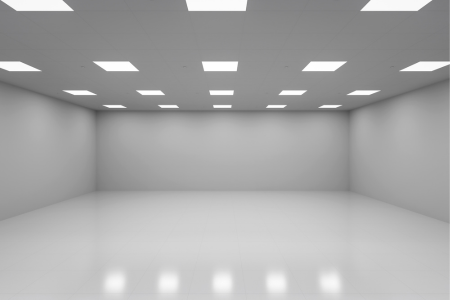When it comes to garage floor sealers, there are enough choices to create confusion. Let’s start with the basics, and drill down to the specifics.
The two types of concrete garage floor sealers are film-forming and penetrating. Film-forming sealers include acrylic, polyurethane, polyaspartic, and epoxy variants. Penetrating sealers include silicate, silane, siloxane, and silicone subtypes.
The Two Seal Types And Their Subtypes
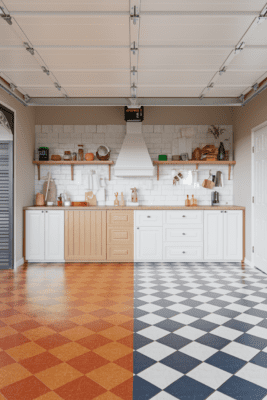
Film-forming sealers a thick, glossy, and opaque. Penetrating sealers seep into the concrete. They are thin and transparent.
There are four subtypes of film-forming sealers. They are:
Film-forming sealers come in four varieties:
- acrylic
- polyaspartic
- epoxy
- urethane
There are four subtypes of penetrating sealers. They are:
- silicate
- silane
- siloxane
- silicone
You’ll learn about the two types of garage floor seals here, and when you’re ready for more, see my articles:
- What is the Ideal Garage Floor Penetrating Sealer?
- Sealing the Deal: Rolling vs. Spraying Garage Floor Sealer
- 7 Things You Should Know Before Painting Your Garage Floor
Film-forming Vs. Penetrating Sealer Application And Results
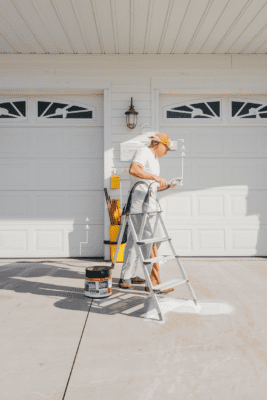
Film-forming sealers usually result in a glossy surface but are sometimes available in matte and natural finishes. A film-forming sealer’s pot life is usually short, meaning the application must go quickly.
Penetrating sealers leave a natural or matte surface. They are much more forgiving about where they’re applied and how long it takes to apply them.
| Comparing Film-Forming to Penetrating Garage Seal Application | ||||
| Finish | Pot Life | Re-application | Oil Protection | |
| Acrylic | matte, natural, satin, semi-gloss, glossy and high-gloss | less than an hour | 2 years | Oil can stain epoxy and disrupt the film that provides protection |
| Polyaspartic | glossy and high-gloss | less than an hour | 10 years | Excellent |
| Epoxy | matte, natural, satin, semi-gloss, glossy and high-gloss | 30 min. to several hours | 10 years | Oil can stain epoxy |
| Urethane | matte, natural, satin, semi-gloss, glossy and high-gloss | 1-3 hours | 10 years | Excellent |
| Gloss, Pot Life, Application, and Oil Protection of Penetrating Concrete Sealants | ||||
| Finish | Pot Life | Re-application | Oil Protection | |
| Silicate | natural, matte, low-sheen | 1-2 hours | 10 years | might stain but will be relatively easy to clean |
| Silane | natural, matte, low-sheen | 4-8 hours | 10 years | might stain but will be relatively easy to clean |
| Siloxane | natural, low-sheen | hours-days (long to longer) | 10 years | might stain but will be relatively easy to clean |
| Silicone | low-sheen, satin | minutes-hours (short to long) | 5 years | might stain but will be relatively easy to clean |
Film-forming Vs. Penetrating Sealer Water Barrier And Breathability
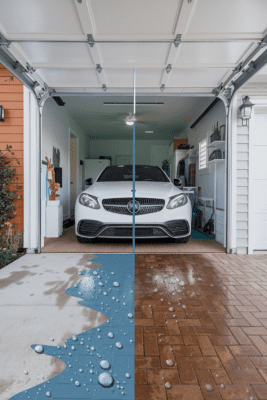
A sealer’s breathability refers to whether it allows water from below the floor to evaporate. If the floor seals too well, it locks in moisture, causing pressure build-up and concrete damage.
Among penetrating sealers, silicate and siloxane have high breathability and so are appropriate for moist garages.
| Type | Water Barrier Protection | Breathability |
| Acrylic | high | medium |
| Polyaspartic | high | low |
| Epoxy | high | low |
| Urethane | high | low |
| Silicate | Low to Medium | high |
| Silane | Medium | medium to high |
| Siloxane | Medium to High | high |
| Silicone | High | low to medium |
How Film-forming Sealers Perform On The Garage Floor
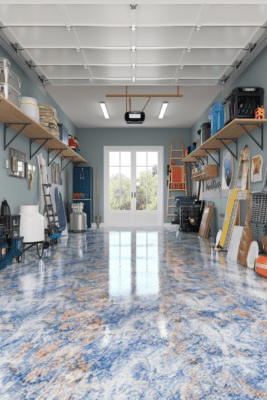
Film-forming sealers provide hard surfaces that protect the concrete. They’re glossy and long-lived, with some notable exceptions.
Pros and Cons of Acrylic Sealers
Acrylic sealers provide a glossy appearance. They offer moderate protection against chemicals, stains, and oil. They are easy to apply, and dry by the next day. An acrylic sealer breaks down quickly and will require a re-application in about 2 years.
Pros and Cons of Polyaspartic Sealers
Polyaspartic sealers are highly durable and excellent at protecting the garage floor from chemicals, abrasion, and ultraviolet rays. They are about as tough as epoxy sealers. Polyaspartic seals dry quickly. they are less prone to failure due to temperature and humidity fluctuations than epoxy and polyurethane.
Polyaspartic sealers are generally more expensive than other sealer options. They have limited “pot life,” requiring a quick application once the seal is ready for application. Because it dries so quickly, there’s little room for fixing poorly applied sealer.
Pros and Cons of Polyurethane Sealers
Polyurethane sealers create a hard, durable surface on the concrete, and have the longest lifespan in the right conditions.
They protect the garage floor from chemicals, oils, gas, road salt, water, and staining. They prevent freeze-thaw cycles and the spalling damage they create.
Urethane is not forgiving of a poorly prepped concrete floor. Urethane applied over a wet floor can peel, haze, mold, and fail to protect the floor.
Pros and Cons of Epoxy Sealers
Epoxy sealers also create a hard, durable surface on the concrete, only slightly less effective than polyurethane. Epoxy floors have long lifespans, and protect the floor from chemicals, oil, gas, salt, water, and staining.
However, epoxy does not hold up well to UV rays, and so yellow when exposed to sunshine. Epoxy does protect the floor from freeze-thaw cycle damage.
Epoxy is not forgiving of poor preparation and will fail if applied over water or damage.
Epoxy sealers are prone to ultraviolet damage from sun exposure. They turn yellow if exposed for too long. Polyurethane sealers do not react to sunshine this way.
How Penetrating Sealers Protect The Garage Floor
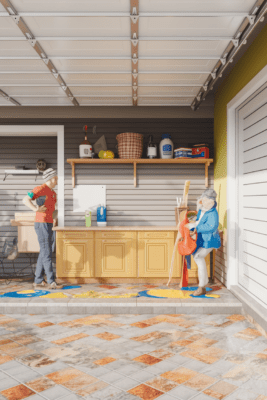
Penetrating sealers are best for lower-traffic areas such as residential garages. Their strengths vary by subtype.
Pros and Cons of Silicate Sealers
Silicate sealers are also known as densifiers. They work by reacting with the concrete to form a hard, insoluble calcium silicate structure within the pores.
Silicate sealers are commonly used to increase the strength and density of the concrete, making it resistant to damage and wear. They do not change the appearance of the concrete.
Pros and Cons of Silane Sealers
Silane sealers are small molecular structure sealers that can penetrate deep into the concrete. They form a hydrophobic barrier that repels water and other liquids, making them excellent for waterproofing. Silane sealers do not significantly change the appearance of the concrete.
Pros and Cons of Siloxane Sealers
Siloxane sealers are similar to silane sealers but have a larger molecular structure. They penetrate less deeply into the concrete but form a wider water-repellent barrier. Siloxane sealers are often used for their excellent water-repelling properties.
Pros and Cons of Silicone Sealers
Silicone sealers penetrate the concrete and form a water-repellent barrier. They are known for their excellent water resistance and durability. Silicone sealers do not significantly change the appearance of the concrete.
Choosing Between Film-forming And Penetrating Sealers
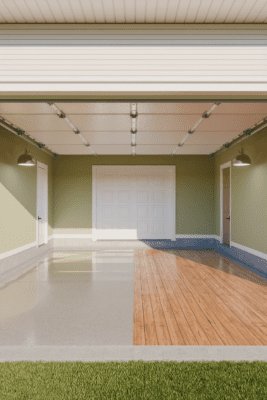
When considering which type of sealer to use on your garage floor, there are several factors to consider. The first factor is the condition of your garage floor.
Sealers for Older Garage Floors
If you have an older, more porous concrete surface, then a penetrating sealer might be a better option since it will bond with the existing concrete to create a strong barrier against moisture and stains.
The second factor to consider is how you plan on using your garage space.
Sealers for Workshop Garage Floors
If you plan on using it as a workshop or storage area, then a film-forming sealer might be better suited for your needs since it will provide superior protection against spills and stains.
Low-traffic garages generally need only a penetrating sealer.
Sealers for Climates with Freezing Weather
You should also consider the climate in which you live when choosing between these two types of sealers. In colder climates where freeze-thaw cycles are common, penetrating sealers tend to hold up better over time since they allow moisture to escape from the concrete surface.
The Case for Using a Penetrating Sealer
Penetrating sealers allow the concrete to “breathe”, which means moisture vapor can escape from the concrete. This is especially important in areas where the concrete might be subject to moisture from below.
Because they do not leave a surface film, penetrating sealers are not subject to peeling or scratching like film-forming sealers.
Penetrating sealers provide excellent protection against moisture intrusion and chloride ion (salt) penetration, which can cause damage to the concrete over time.
Penetrating sealers typically require less maintenance than film-forming sealers. They do not need to be reapplied as often, and there’s no film that can wear away over time.
As they do not leave a glossy or potentially slick surface like some film formers, penetrating sealers can be safer in terms of slip resistance.
The Case for a Using Film-Forming Sealer
Film-forming sealers create a colorful, glossy, and rich coating on the garage floor.
Film-forming sealers are better at stain protection than penetrating sealers, with the exception that epoxy is prone to oil stains and UV damage.
Film-forming sealers are smooth, making them easy to clean.
Is there One “Ideal” Sealer Type for the Garage?
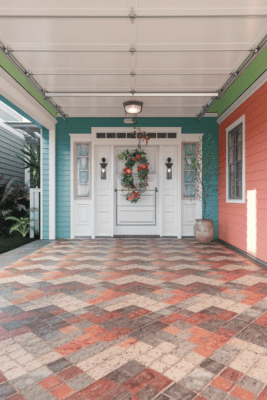
Traffic, climate, aesthetics, UV exposure, and ground moisture guide which subtype of garage floor sealer you use.
Acrylic does best with low to moderate traffic in a sunny, warm, and dry climate.
Epoxy stands up well to high traffic and chemical spills but does not do well when exposed to oil or sunshine.
Polyurethane also does well in high traffic and when exposed to chemicals. It does not react to oil or sunshine.
Polyaspartic sealer combines the strengths of epoxy and polyurethane. It does well in extreme temperature variations and stands up to chemicals and sunshine.
Silicate does well in a low-traffic garage in a dry area.
Silicone is a good choice for low to moderate traffic in a damp environment.
Silane and siloxane are good for cold and snowy climates and low to moderate traffic.
| Table: The Ideal Sealer Type Based on Traffic and Climate | ||||
| Traffic | Climate | Type | Subtype | Main Reason |
| low to moderate | warm, dry | film-forming | acrylic | UV resistance, good for occasional use garages |
| high traffic, chemical spills | variable | film-forming | epoxy | High durability, excellent for heavy-duty and workshop garages |
| high traffic, chemical spills | variable | film-forming | polyurethane | Exceptional durability, excellent for commercial or multi-purpose garages |
| high traffic, chemical spills | extremely variable | film-forming | polyaspartic | Exceptional durability, excellent for commercial or multi-purpose garages |
| low to moderate | dry | penetrating | silicate | Deep penetration, good for storage or rarely used garages |
| low to moderate | damp, rainy | penetrating | silicone | Excellent water repellency, good for garages in high moisture areas |
| low to moderate | cold, snowy | penetrating | silane and siloxane | Excellent water and salt repellency, ideal for garages in areas with harsh winters |


